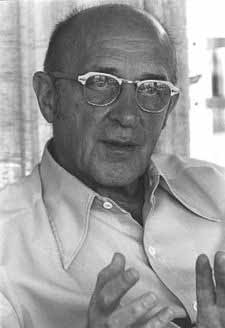

Carl Rogers (January 8, 1902 – February 4, 1987) was an influential American psychologist and among the founders of the humanistic approach to psychology. Rogers is widely considered to be one of the founding fathers of psychotherapy research and was honored for his pioneering research with the Award for Distinguished Scientific Contributions by the American Psychological Association in 1956.
The person-centered approach, his own unique approach to understanding personality and human relationships, found wide application in various domains such as psychotherapy and counseling (client-centered therapy), education (student-centered learning), organizations, and other group settings. For his professional work he was bestowed the Award for Distinguished Professional Contributions to Psychology by the APA in 1972. Towards the end of his life Carl Rogers was nominated for the Nobel Peace Prize for his work with national intergroup conflict in South Africa and Northern Ireland.
In an empirical study by Haggbloom et al. (2002) using six criteria such as citations and recognition, Rogers was found to be the sixth most eminent psychologist of the 20th century and second, among clinicians, only to Sigmund Freud.
Rogers was born on January 8, 1902, in Oak Park, Illinois, a Chicago suburb. His father Walter A. Rogers was a civil engineer and his mother, Julia M. Cushing, was a housewife and devout Pentecostal Christian. Carl was the fourth of their six children.
Rogers was quite smart and could read well before kindergarten. Following an education in a strict religious vicarage of Jimpley and ethical environment as an altar boy, he became a rather isolated, independent and disciplined person, and acquired a knowledge and an appreciation for the scientific method in a practical world. His first career choice was agriculture, at the University of Wisconsin–Madison, followed by history and then religion. At age 20, following his 1922 trip to Peking, China, for an international Christian conference, he started to doubt his religious convictions. To help him clarify his career choice, he attended a seminar entitled Why am I entering the Ministry?, after which he decided to change his career.
After two years he left the seminary to attend Teachers College, Columbia University, obtaining an MA in 1928 and a PhD in 1931. While completing his doctoral work, he engaged in child study. In 1930, Rogers served as director of the Society for the Prevention of Cruelty to Children in Rochester, New York.
From 1935 to 1940 he lectured at the University of Rochester and wrote The Clinical Treatment of the Problem Child (1939), based on his experience in working with troubled children. He was strongly influenced in constructing his client-centered approach by the post-Freudian psychotherapeutic practice of Otto Rank.
In 1940 Rogers became professor of clinical psychology at Ohio State University, where he wrote his second book, Counseling and Psychotherapy (1942). In it, Rogers suggested that the client, by establishing a relationship with an understanding, accepting therapist, can resolve difficulties and gain the insight necessary to restructure their life.
In 1945, he was invited to set up a counseling center at the University of Chicago. While a professor of psychology at the University of Chicago (1945–57), Rogers helped to establish a counseling centre connected with the university and there conducted studies to determine the effectiveness of his methods. His findings and theories appeared in Client-Centered Therapy (1951) and Psychotherapy and Personality Change (1954).
One of his graduate students at the University of Chicago, Thomas Gordon, established the Parent Effectiveness Training (P.E.T.) movement. In 1956, Rogers became the first President of the American Academy of Psychotherapists.[6] He taught psychology at the University of Wisconsin, Madison (1957–63), during which time he wrote one of his best-known books, On Becoming a Person (1961).
Rogers continued teaching at University of Wisconsin until 1963, he became a resident at the new Center for Studies of the Person in La Jolla. Rogers left the WBSI to help found the Center for Studies of the Person in 1968. His later books include Carl Rogers on Personal Power (1977) and Freedom to Learn for the 80's (1983).
He remained a resident of La Jolla for the rest of his life, doing therapy, giving speeches and writing until his sudden death in 1987. In 1987, Rogers suffered a fall that resulted in a fractured pelvis bone. He had a successful operation, but his pancreas failed the next night and he died a few days later.
Rogers' last years were devoted to applying his theories in areas of national social conflict, and he traveled worldwide to accomplish this. In Belfast, Northern Ireland, he brought together influential Protestants and Catholics; in South Africa, blacks and whites, in the United States, consumers and providers in the health field. His last trip, at age 85, was to the Soviet Union, where he lectured and facilitated intensive experiential workshops fostering communication and creativity. He was astonished at the numbers of Russians who knew of his work.
Together with his daughter, Natalie Rogers, between 1975 and 1980, Rogers conducted a series of residential programs in the US, Europe, and Japan, the Person-Centered Approach Workshops, which focused on cross-cultural communications, personal growth, self-empowerment, and social change.
Rogers' theory of the self is considered to be humanistic and phenomenological. His theory is based directly on the "phenomenal field" personality theory of Combs and Snygg (1949). Rogers' elaboration of his own theory is extensive. He wrote 16 books and many more journal articles describing it. However, Prochaska and Norcross(2003) states Rogers "consistently stood for an empirical evaluation of psychotherapy. He and his followers have demonstrated a humanistic approach to conducting therapy and a scientific approach to evaluating therapy need not be incompatible."